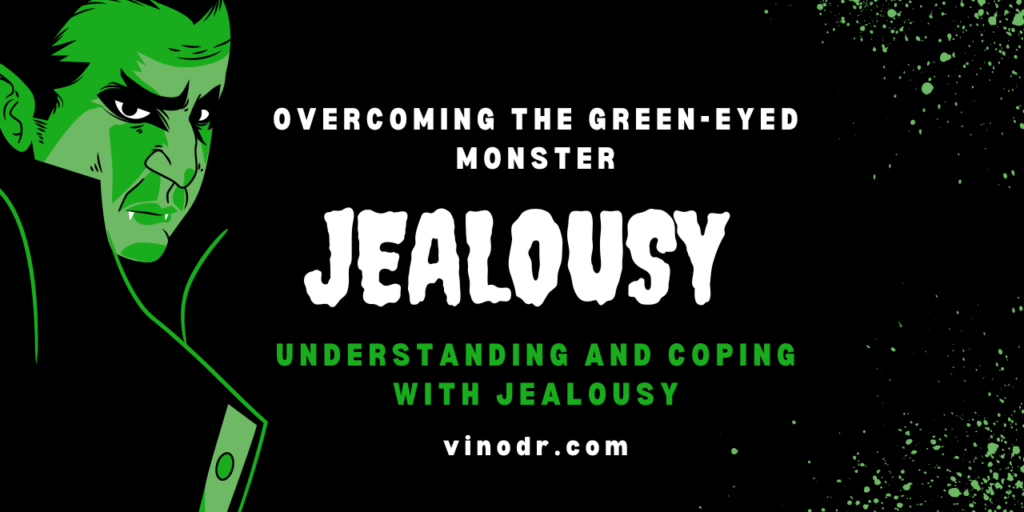Jealousy The Green-Eyed Monster
Overcoming the Green-Eyed Monster: Understanding and Coping with Jealousy
Jealousy
Jealousy is an emotional response to the perceived threat of losing something or someone important to us to a third party. It is a complex and often intense emotion that can manifest in various forms, such as envy, suspicion, possessiveness, and insecurity.
Jealousy can be triggered by a range of situations, including romantic relationships, friendships, career success, and material possessions. In romantic relationships, jealousy can stem from fears of infidelity or emotional distance. In friendships or social situations, jealousy can arise from feelings of exclusion or competition.
Jealousy is a natural human emotion; it can be detrimental to our well-being if left unchecked. Excessive jealousy can lead to negative behaviors such as controlling behavior, manipulation, and emotional abuse. It can also damage relationships, erode trust, and cause stress and anxiety.
Men and women may experience jealousy differently, with men tending to feel more jealous in response to sexual infidelity, and women tending to feel more jealous in response to emotional infidelity.
To manage jealousy, it is essential to recognize and acknowledge our feelings, communicate openly with others, and work on building self-esteem and self-confidence. It is also important to develop healthy coping mechanisms, such as practicing mindfulness, seeking professional help, and engaging in self-care activities.
Jealousy vs Envy
Jealousy and envy are two closely related but distinct emotions. While they both involve wanting something that someone else has, there are some differences between the two.
Jealousy is a reaction to the perceived threat of losing something that we already possess, such as love or a possession. It involves feelings of fear, insecurity, and possessiveness. For example, a person may feel jealous if they perceive their romantic partner is interested in someone else, or if a friend is spending more time with another friend.
Envy, on the other hand, is a desire to possess something that someone else has. It involves feelings of longing, desire, and admiration. For example, a person may feel envious of their neighbor’s new car or a friend’s successful career.
While both jealousy and envy can be negative emotions, envy can sometimes be seen as more benign or even positive, as it can motivate people to strive for something they admire. Jealousy, on the other hand, can be more destructive, as it often involves possessiveness, controlling behavior, and fear of loss.
Jealousy is a fear of losing something we already have, while envy is a desire to possess something we do not have.
Are you Jealous?
Jealousy can manifest in different ways, and it may not always be easy to recognize it in ourselves.
Possessiveness: You may feel a strong need to control the person or thing you are jealous of. For example, you may not want your partner to spend time with someone you perceive as a threat.
Insecurity: You may feel insecure about yourself and your relationship or position in a group. You may worry that someone else is better or more desirable than you.
Suspicion: You may be suspicious of others’ intentions or actions, especially those related to the person or thing you are jealous of.
Resentment: You may feel resentment towards the person or thing you are jealous of, even if they have done nothing wrong.
Fear: You may fear losing the person or thing you are jealous of, and this fear may cause you to act in irrational ways.
Anger: You may feel angry or frustrated when you perceive a threat to the person or thing you are jealous of.
Low self-esteem: People with low self-esteem may be more prone to experiencing jealousy because they have a negative view of themselves and feel threatened by the success or attention of others.
Social comparison: Jealousy can arise from comparing ourselves to others and feeling like we are not measuring up. This can be particularly common in today’s society, where social media can create a constant stream of opportunities for social comparison.
Previous experiences: Past experiences of rejection, betrayal, or loss can make us more vulnerable to jealousy in future situations.
Personality traits: Some people may be more prone to jealousy due to certain personality traits, such as high levels of neuroticism or a strong need for control.
If you notice these signs in yourself, it may be a sign that you are experiencing jealousy. It’s important to recognize and acknowledge these feelings so that you can address them and find ways to cope with them in a healthy way.
How can jealousy jeopardize your life?
Jealousy can have many negative consequences on your life if left unaddressed.
Damage to relationships: Excessive jealousy can damage your relationships with others. It can cause you to become possessive, controlling, and suspicious, which can push people away.
Loss of trust: Jealousy can erode trust in relationships. If you are constantly suspicious of others, they may begin to question your trustworthiness, and you may lose the trust of those around you.
Emotional distress: Jealousy can cause emotional distress, leading to feelings of anxiety, depression, and low self-esteem.
Isolation: If your jealousy causes you to push people away or isolate yourself from others, you may become socially isolated, which can lead to feelings of loneliness and depression.
Negative behaviors: Jealousy can lead to negative behaviors such as stalking, harassment, or even violence in extreme cases.
Career setbacks: If your jealousy affects your ability to focus on your work, it can have a negative impact on your career and prevent you from achieving your goals.
Physical health problems: Chronic jealousy can lead to physical health problems such as high blood pressure, heart disease, and digestive issues.
Overcoming Jealousy
Jealousy is a complex emotion that can have different underlying causes depending on the individual and the situation. But using some strategies we can take some actions to overcome jealousy.
Acknowledge and understand your jealousy: The first step in controlling jealousy is to acknowledge and understand it. Recognize when you are feeling jealous, and try to identify the source of your jealousy. Understanding your emotions can help you better manage them.
Challenge your thoughts: Jealousy often involves irrational thoughts and beliefs. Challenge these thoughts by questioning their validity and looking for evidence to support or contradict them.
Practice gratitude: Focusing on what you have rather than what you lack can help reduce feelings of jealousy. Take time to appreciate the good things in your life, such as supportive friends or family, a fulfilling job, or a comfortable home.
Communicate openly: If your jealousy is related to a specific person or situation, consider talking to the person involved. Be honest about your feelings and try to find a solution that works for both of you.
Work on your self-esteem: Jealousy can stem from feelings of insecurity or low self-esteem. Work on building your self-esteem by practicing self-care, setting realistic goals, and recognizing your strengths and accomplishments.
Focus on personal growth: Instead of comparing yourself to others, focus on your own personal growth and development. Set goals for yourself and work towards them, whether it’s learning a new skill or pursuing a hobby.
Seek professional help: If your jealousy is causing significant distress or interfering with your daily life, consider seeking professional help. A therapist or counselor can help you work through your emotions and develop healthy coping strategies.
Managing our emotions whatever they may be (Love, Fear, Selfishness, jealousy) is an ongoing process that takes time and effort. Be patient with yourself and practice self-compassion as you work towards controlling jealousy in your life.



